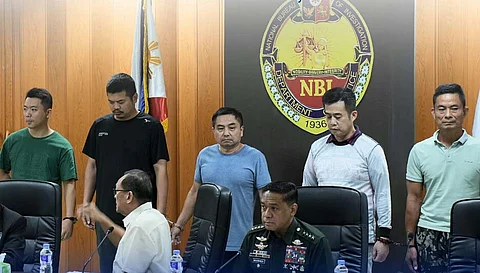
- NEWS
- the EDIT
- COMMENTARY
- BUSINESS
- LIFE
- SHOW
- ACTION
- GLOBAL GOALS
- SNAPS
- DYARYO TIRADA
- MORE

Authorities are looking into the possibility that the recently arrested Chinese “spies” in the Philippines were sleeper agents who had integrated into society for decades before engaging in covert operations.
This came about after Immigration Commissioner Joel Anthony Viado disclosed on Sunday that the alleged spies had been living in the country for years — some since 2002 — before their suspicious activities were detected by the Armed Forces of the Philippines (AFP) and the National Bureau of Investigation (NBI).
“Following President Ferdinand Marcos Jr.’s directive to safeguard national sovereignty, we have examined the records of these individuals and confirmed their long-term presence in the Philippines,” Viado said.
Some of the arrested individuals had working visas linked to companies in San Juan and Manila, while others were married to Filipinas, giving them legitimate cover for their prolonged stay in the country.
Viado urged the public to report any foreign national activity that may threaten national security.
“We are intensifying our efforts to prevent undesirable aliens from abusing our hospitality. The Bureau is working closely with the Department of Justice (DoJ), NBI and AFP to compile intelligence on the suspects,” he added.
The National Security Council has expressed serious concern over the arrests, warning that the espionage cases pose a significant threat to national security.
Earlier, National Security Adviser Eduardo Año pointed to the surveillance of Philippine Navy and Coast Guard installations in Palawan as a particularly alarming development.
“Their (spies’) activities near Ulugan Bay and Naval Detachment Oyster Bay, as well as their surveillance of Coast Guard stations and naval docks, are serious concerns that warrant a firm and coordinated response,” Año stated.
He commended the AFP, Intelligence Service of the AFP, National Intelligence and Security Force, NBI and BI for their swift and decisive actions leading to the arrests.
“These operations highlight the need for continued vigilance and proactive counterintelligence measures to detect and disrupt espionage attempts within our borders,” Año added.
The arrests came amid escalating tensions between the Philippines and China over territorial disputes in the West Philippine Sea.
Año confirmed that the detainees were under surveillance by Philippine military and law enforcement authorities following the earlier arrest of Deng Yuanqing and two Filipino accomplices.
Deng and his team were caught conducting aerial reconnaissance and collecting imagery intelligence on Philippine naval assets in Luzon.
President Ferdinand Marcos Jr. has voiced deep concern over the unfolding espionage cases, saying, “We are very disturbed by anyone conducting such espionage operations against our military.”
Those arrested were allegedly using drones and high-resolution camera equipment to record movements at air and naval bases, including supply routes to military garrisons in the disputed South China Sea.
Despite growing evidence, the Chinese Embassy in Manila has dismissed the allegations, accusing the Philippines of exaggerating the issue. Chinese authorities have yet to comment on the latest wave of arrests.
Año, however, assured the public that the government remains steadfast in its commitment to enforcing the law and holding those involved in espionage accountable.
“The Philippines will continue to strengthen counterintelligence and monitoring efforts to bolster our national security,” he emphasized.
The recent espionage arrests have also revived concerns over the case of Bamban, Tarlac Mayor Alice Guo, whose background remains under scrutiny for alleged links to Chinese intelligence networks.
Guo, whose origins and nationality have been questioned by lawmakers and intelligence officials, has been under investigation following revelations of her potential ties to foreign entities engaged in illicit operations within the Philippines. Authorities are now examining whether Guo’s controversial rise to power and her alleged involvement in shielding Chinese-linked businesses, including Philippine Offshore Gaming Operators, are connected to a broader espionage network operating in the country.
Her ties to several Chinese nationals with questionable immigration records have fueled speculation that she may have facilitated entry and cover for individuals conducting intelligence operations.
Senator Risa Hontiveros previously raised red flags over Guo’s lack of verifiable personal history, casting doubt on her claims of being a natural-born Filipino.
Guo’s case, combined with the latest arrests, has intensified calls for a nationwide review of foreign nationals embedded in key positions or businesses.
